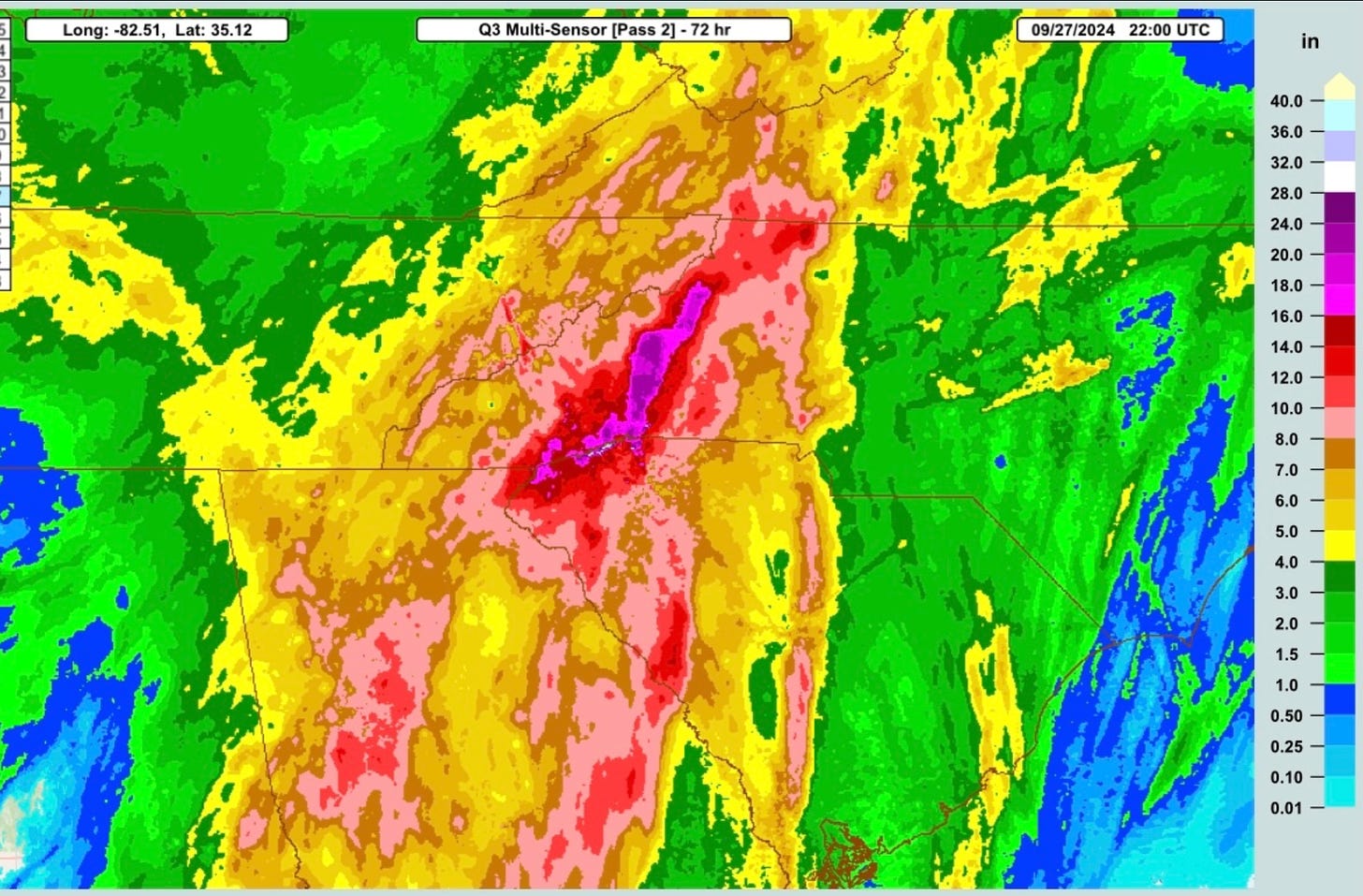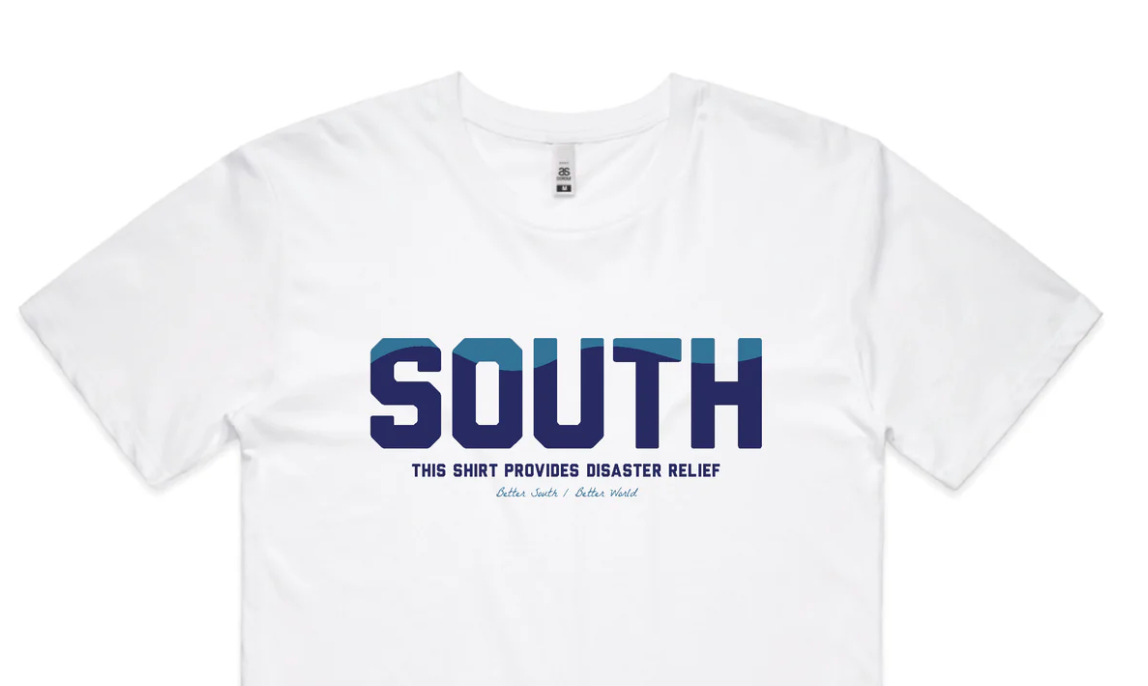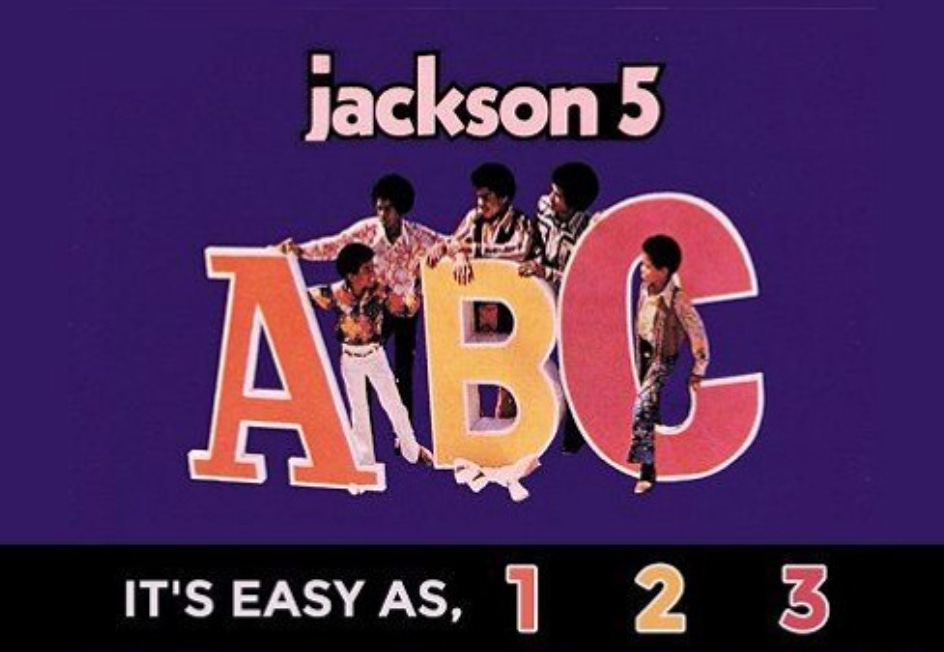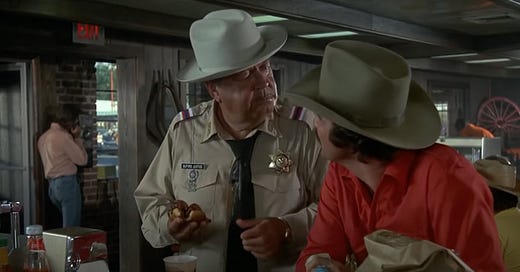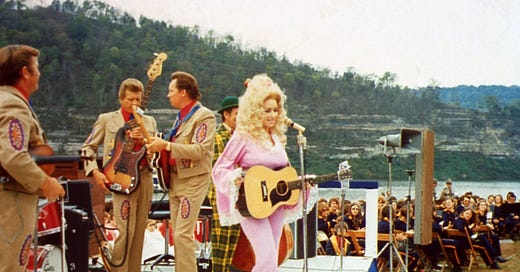

Discover more from Flashlight & A Biscuit
Hurricanes Helene and Milton: Memories washed and blown away
Some thoughts on the twin scars that two terrible storms left on the South.
Welcome to Flashlight & A Biscuit, my Southern culture/sports/music/food offshoot of my work at Yahoo Sports. Thanks for reading, and if you’re new around here, why not subscribe? It’s free and all.
Today: We’re back! Apologies for the lengthy delay since last we hung out — and welcome new friends who’ve joined us since then. Let’s get to it.
After the last two weeks, I want to punch a hurricane in the goddamn face, and I bet many of you do too.
There’s this truly cruel aspect of a hurricane in the hours after it passes. The sun shines brightly on the ruined land, and the storm blows on out to sea, dissipating into a harmless gentle breeze. It feels somehow not just unfair but wrong, on a deep moral level, that a storm can tear apart lives and communities, and then just dissolve into the prettiest damn day you’ve ever seen.
And of course, it’s wrong on a philosophical level to attribute any kind of cruelty, morality or responsibility to a storm. It’s Nature, ungovernable and unconcerned with the laws and codes of humanity. But that’s one consequence of personifying hurricanes with names like Helene and Milton … you want them to suffer for what they’ve done, even as you know how ridiculous that sounds. What, you’re going to punish a storm? How would that even work? Send it to time out in the plane-swallowing South Pacific?
These are the kinds of thoughts that come to mind after seeing the devastation wrought by Helene and Milton in the last two weeks. The idea that a storm can spin up out of nowhere, wreck your entire existence, and then spin right out into nothingness a few hours later is a terrifying one, and imagining you could wrestle a hurricane is some lizard-brain way of reasserting some kind of control in a world where you’re so clearly powerless.
Helene and Milton carved deep scars across the South, scars that won’t ever truly heal. The stories of loved ones, homes, lives swept away in the floods that scoured North Carolina and Tennessee are so heartbreaking I often can’t even get past the headlines. The wind that blasted Valdosta down to the sand and threw pine trees into houses in Augusta like pencils was the same wind that kept us in Atlanta up all night, listening for the whistle to rise to a howl.
When I see the images of the devastation in the storm’s wake, I imagine all the scattered little bits of a life — wedding photos, refrigerator magnets from long-ago vacations, grandmothers’ china that had gathered dust, long-ago schoolwork and report cards, figurines, baseball cards, clay pots made by little hands decades ago. They have no value outside the home, but inside the home they’re priceless. And now, for so many, there’s no home at all, not anymore.
The ever-present whirl of news means that, for the rest of the country, Helene and Milton will recede quickly into memory, the way that, say, wildfires in California or tornadoes in Oklahoma do for those of us around here. It’s a necessary element of the human condition — if you cared equally for everyone suffering in America, you’d lose your mind … or you wouldn’t care about any of them, one of the two. It’s why so many who are devastated in the wake of a tragedy feel abandoned — because in a very real way, they are. Not intentionally — the world just moves on, with or without us — but the effect is sadly the same.
I linked to this song back when Jimmy Buffett died, but it’s one of my favorites, and sadly, it’s topical again. Written in the wake of Katrina’s devastation, “Breathe In, Breathe Out, Move On” is a meditation on acceptance, resilience and quiet determination. It’s the kind of song you listen to before getting back to the work of cleanup.
The storm reveals character.
The vast majority of Southerners have leaped in to help their neighbors, no matter what yard signs they may have planted before the floods washed them all away. That’s what most people do, recognize a neighbor in need and snap to help. But the many stories of people helping people, extending hands and opening their homes and hearts and businesses and houses of worship, don’t seem to make their way to the top of your newsfeed.
Why not? Because there are also those whose character is revealed to be deeply lacking — the ones who exploit tragedy, who twist every scenario to fit a petty political worldview, who spew out misinformation and outright lies designed to keep us siloed in angry little shells instead of reaching out and connecting with one another for a greater good.
Anyway. Breathe in. Breathe out. Move on.
There’s plenty of reliable information out there from journalists and others on the ground who — and this is crucial — know the area and the people better than any of us outsiders. Here, for instance, is a piece on the wonderful North Carolina-based newsletter NC Rabbit Hole about what it’s like in Asheville, a city that was consumed with water and, then, no water at all. Here’s another on a return to a time-honored form of civic connection among neighbors — the town meeting. Hannah Raskin’s must-read The Food Section checks in with her North Carolina-based correspondents for — again — accurate reporting on the ground. And over at his Road Rodge newsletter, college football vagabond Rodger Sherman has offered up some thoughts on App State and other colleges (and college towns) battered by the storm.
If you’re of a mind to do so, here are some vetted and trusted places where you can give aid to the people of North Carolina. Cold weather is coming soon to the mountains, and with it a whole new set of problems and challenges. My pals over at Channel 6 recommend the East Tennessee Foundation’s Neighbor to Neighbor Relief Fund, among so many others. And my man Marty Smith is co-hosting a Concert for Carolina soon that features Eric Church, Billy Strings and a whole bunch of other stars. Tickets are sold out, but there’s a link to more foundations looking to help out, and hell, they’ll probably set up a pay-per-view, too.
And if you want a little something for your efforts — hey, no shame in that, everyone likes merch — head over to the exceptional Bitter Southerner site and pick up a disaster relief t-shirt for $32:
If you’re in Charlotte, the Panthers are selling a “Keep Pounding for the Carolinas” shirt. Seems only to be in-person at the team store for now, but if anyone wants to hook me up with one, I’ll Venmo you:
I haven’t yet heard about anything specific for Florida-centric Milton relief, but if you know of anything, drop it in the comments below.
Hope you and yours are safe and sound, whether or not the storms directly impacted you. Good to be back talking with you; let’s do it more often, huh?
Coming soon, the reason why I’ve been MIA around these parts for a few months (it’s good news), and coming next week, our annual dive into the State Fair of Texas food offerings. C’mon back, y’hear?
—Jay
Land Cat, Georgia
This is issue #123 of Flashlight & A Biscuit. Check out all the past issues right here. Feel free to email me with your thoughts, tips and advice. If you’re new around here, jump right to our most-read stories, or check out some of our recent hits:
Our first documentary, on the famous Rama Jama’s diner in Tuscaloosa, Alabama:
Let’s all open a bar together and get rich
A story of good dogs and a great book
What does “Flashlight & A Biscuit” mean, anyway?
Keep in touch with me via email right here. And load up a to-go box before you leave:
If you dig this newsletter, share it with your friends. Invite others to the party, everyone’s welcome.
Subscribe to Flashlight & A Biscuit
Kick back with some tales of Southern culture, sports, food and music from Jay Busbee. Grill's already hot; drinks are on ice. Pull up a chair.




